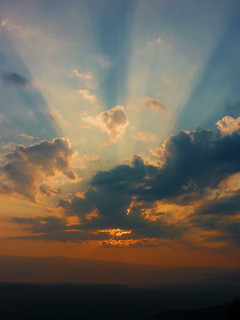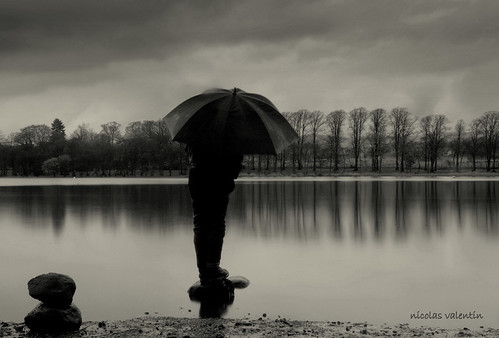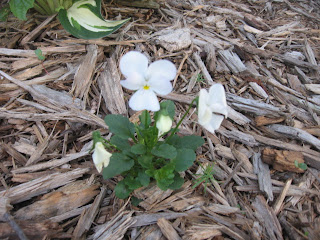It is finally August. The air is thick with late summer humidity, the drone of cicadas and crickets, the smell of lavender, thunder storms and dry grass; the sun is at its strongest, its most radiant. I've been out tending to my bit of earth and weeding as much I can around the side of the house where the roses are riding out the heat. I have what you might call a greenish thumb: gardens enchant me and I'd like to plan and sculpt and keep a garden someday when my situation is a little more permanent. Until that day, I am enjoy the garden as a place of discovery and endless musing. This is good exercise for the writer's brain.
One such discovery this week was that of wild garlic clusters growing up where the irises are situated on the south side of the house. Granted, in the few years I've lived here I'd always wondered what those white pod-looking things were but always tore them out in an effort to maintain order and never once thought to compare the shape to the typical bulb you buy in the produce aisle... or put it my mouth and bite down. I was thrilled when that taste burst across my tongue, and I instantly had the thought that if this was some post-apocalyptic world, a discovery of garlic might just be a gold mine. I wonder what Katniss Everdeen would trade for wild garlic.
 | ||
| These little garlics aren't single bulbs, but a little bundle of tiny kernels - exactly the size of popping corn. |
 | |
| Wild garlic kernels bursting from their pouch. |
This discovery sparked to life old memories of similar finds from childhood. My parents had green thumbs and hands when I was growing up: vegetables from tomatoes to squash to accidental corn; and wide variety of roses, flowering bushes and our own little patch of annuals (bachelor's buttons, zinnias, marigolds) we little ones took pride in. My parents would use mint and basil and chives from the garden, and once in a while when Dad was doing his autumn-time chipper-shredding, a wild onion would accidentally wind up in the chipping pile and get into his eyes. Once, I found a little patch of wild strawberries once growing cozily alongside the roses. I remember my little heart jumping for joy when I saw those little red berries - and they tasted so sweet - different from the ones you buy in the store.
The little strawberries made me think of the wild blueberries my sister and I discovered behind our relatives' cottage in Maine. The cottage was a rustic little house - no air conditioning, antique furniture, a tide clock (which impressed me; everything about coastal Maine, tide pools and sea creatures fascinates a child who grew up in Nebraska) and the smell of saltwater and sand. I first tasted saltwater taffy in this place, and perhaps even my first lobster. I remember scores of family members - sadly many, many of them gone - crowding into that house. And then the blueberries. We were told not to eat the berries, but we went out when no one was looking and gorged ourselves. Mom must have noticed it smeared on our faces or something because she flipped out: she thought we were eating the poisonous red berries from the bushes that separated the cottage from the neighboring plot. Until we were caught, it was heaven. Years later, we returned for a visit to find the cottage torn down and replaced with a snazzier, fancier, air-conditioned house. The blueberries were gone. It was almost as if I'd dreamt them.
I think it was the idea that you could grow food in your own backyard that thrilled me. Your own berries! Your own tomatoes! Your own herbs! My father's parents had two or three apple trees. I remember helping to pick apples and put them in baskets, and how the baskets were shaped: bucket-like with wooden slats. Gramma would make pies and applesauce. And I have the strangest recollection of being told to be careful of worms. Papa would peel the apples with a knife, which I thought was strange because Dad had a special apple-peeling device with a crank that seemed to make it so much easier. When the apple trees died, we played on the empty stumps until they were finally pulled out. Gone were our apple adventures and the climbing posts. Gramma and Papa's yard seemed so empty without them.
This love of fruit and veg thriving in the garden is still alive in me. I maintain tomatoes, peppers and beans with my roommate. We are constantly fighting the weedy grape vines (that WON'T die no matter what we do to them) that have been blocking the sunlight from the tomatoes, and the "volunteer" trees that grow between the fences. But there is something fulfilling in tending to these plants, deciding what stays or goes (if it's a pretty weed, it can stay), and discovering wild lilies or garlic... or finding that the violas, once bunny salad, have finally grown back and have flowered magnificently. There is no greater joy than that.
Gardens must be tended, but it's amazing what can grow on its own unnoticed in the shade, in the random corner of the yard, around the cedar tree, behind the shed... without having to be coddled, pruned or yanked out by the roots. Writing is this way, too. Sometimes you have to let it grow wild and rampant in order to see just what's in it.
 |
| Bunny salad no more: my violas are finally thriving. |
















 Apart from the neighborhood squirrels digging in the pot for non-existent acorns, I'm satisfied to call this a success!
Apart from the neighborhood squirrels digging in the pot for non-existent acorns, I'm satisfied to call this a success!


